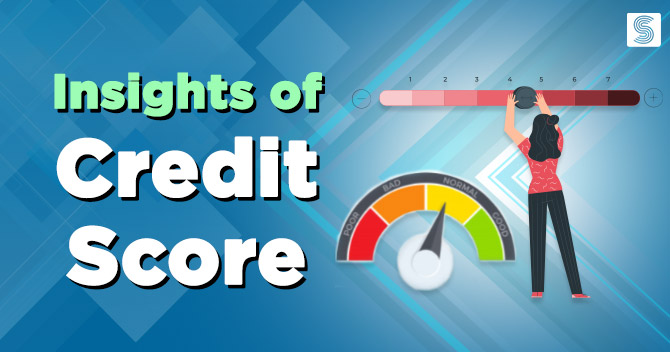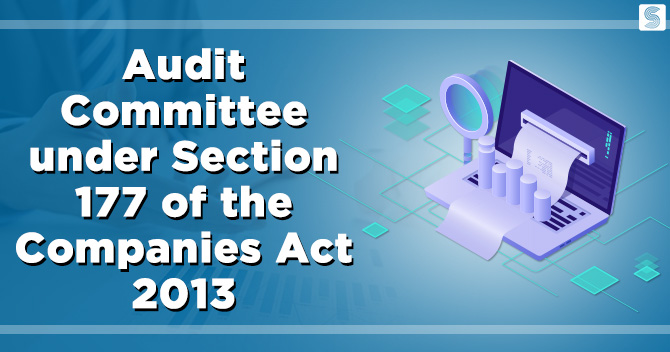Insights of Credit Score and importance to maintain it

Dashmeet Kaur | Updated: Mar 19, 2020 | Category: Finance & Accounting
The economic growth of a nation is directly proportional to the development of its financial sector. An adequate number of lending and borrowing facilities represents a stable nation. Loans have always been a pivotal source of funding for every individual who is in a need of funds. Several financial institutes like banks and NBFC’s provide an array of credit or loans at a moderate rate of interests. The lending entities consider numerous factors to evaluate the prospect that an individual shall repay the loan in a stipulated timeframe. One such important factor is the Credit Score of a borrower. This write-up will accentuate the insights of Credit Score.
Table of Contents
What is a Credit Score?
Credit Score refers to a statistical number which reckons the creditworthiness of a person based on his/her credit and repayment history. Banks and other financial institutes use Credit Scores to estimate the amount of potential risk involved in lending the funds to a particular person. It also helps to determine the interest rate, qualified applicants for loans and credit limits.
Basically, a Credit Score indicates a three-digit number which falls within the scale of 300-900 wherein, 900 remains the highest. One must always emphasize on maintaining a good Credit Score that reaches close to 900. People with a good Credit Score can yield several benefits during the time of taking a loan or applying for a Credit card. However, a low Credit Score defames your reputation and implies that you are not a responsible borrower who is inefficient in repaying the borrowed money.
Apart from financial entities, many organizations deploy the technique of Credit Score, such as insurance and mobile phone Companies, Government Departments, landlords etc.
An insight into the functioning of Credit Score
Credit ratings can make or break your financial position. It is indispensable to maintain the Credit Scores to avail loans at lower interest rates. Banks or lenders usually impose a higher interest rate to the subprime borrowers as compensation for the higher risk of lending. The subprime borrowers significantly those people whose Credit Score is below 640 are required to repay loans on shorter terms or require a Cosigner for loan approval.
Let’s perceive the different Credit Score ranges and what they stand for:
- NA/NH: A Credit Score depends upon a person’s credit history. If an individual doesn’t have any credit history, then his credit report will state that his Credit Score is NA (Not Applicable) or NH (No History).
- 300 -549: A Credit Score that lies between the range of 300 to 549 is considered as bad. A person with such a score is entitled to be an irresponsible borrower who has unpaid dues and did defaults on the payments.
- 550-649: This Credit Score is regarded as average with a scope of improvement.
- 650-749: The lenders consider a Credit score of 650 to 749 as good. Therefore, the lenders easily offer loans or credit cards to the borrowers with a good rating while they might not get the leverage to negotiate a great deal.
- 750-900: An individual with this Credit Score often gets loans on cheaper interest rates. Moreover, it also provides additional powers to negotiate a deal for Credit cards with better rewards.
List of Credit Rating Agencies in India
A Credit Rating Bureau is an organization that assesses the creditworthiness of an individual and estimates his ability to repay the loan amount. Credit Rating Agencies provide a Credit Score of individuals that helps financial institutions or banks to determine whether to sanction a loan to a person based on his financial history or not. India has six Credit Rating Bureaus that streamline the lending procedure by providing insights of Credit Score which are as follows:
- CRISIL or Credit Rating Information Services of India Limited
- ICRA Limited
- SMERA (Small and Medium Enterprises Rating Agency of India)
- CARE (Credit Analysis and Research Limited)
- Brickwork Rating
- India Ratings and Research Pvt. Limited
SEBI (Securities and Exchange Board of India) authorizes and regulates Credit Rating Agencies in India under SEBI Regulations, 1999 of SEBI Act [1] , 1992. Credit Rating Bureaus analyze the credit history of the individuals and assign Credit Scores to them.
Tips to maintain a good Credit Score
Now you must have understood the importance of a good Credit Score. Here are the ways to maintain it:
- Pay bills on time: Though in the hustle and bustle of the daily regime, one can forget to pay the bills on time, it can have an adverse effect on the Credit Score. Thus, aim to pay your bills of utilities, mobile phone service, rent before the deadline.
- Manage Credit Utilization Ratio: It is yet another significant aspect to improve your Credit Score. It is the percentage of your total outstanding credit balances divided by the sum of your credit limits. It is advisable to keep a ratio under 30%.
- Be vigilant while closing a Credit Card: While applying for a new Credit card, you may feel to close your old one due to some or the other reasons. However, it is prudent not to close an old Credit card that you have been using for a long time since it provides your financial history. Additionally, one must keep the existing Credit card active by doing small transactions once in a while.
- Do not withdraw cash from your Credit card: It is one of the most common mistakes that we commit without apprehending the aftermath that will directly impact the Credit Score. When you use your Credit card to withdraw some cash from ATM or Bank, it is considered as a cash advance. Hence, you end up paying a high-interest rate that ultimately affects your credit history.
Insights of Credit Score myths
There are various myths and fallacies associated with Credit Scores that mislead borrowers. Take a closer look at some of the myths related to Credit Score:
- Credit Score infringes your personal details: It is misinterpreted that when a Credit Rating Agency estimates the Credit Score, it fetches additional information of a person than financial history whereas RBI approved Credit Bureaus only scrutinizes your borrowing history like credit accounts, outstanding debts to evaluate your Credit Score.
- Banks solely lend based on the Credit Score: Another common myth is that banks or NBFC’s only examines a Credit Score to reject or accept a Loan Application. While Credit Score is an important source to determine the creditworthiness of a person, yet there are several other factors such as Debt-to-Income Ratio, employment history, etc. Moreover, banks also have their underwriting policies.
- A college degree is equivalent to a higher Credit Score: Despite many other fallacies, it remains the most baseless myth. There is no connection between educational degree and credit ratings. As long as one possesses stable income with a feasible Debt-to-Income Ratio, the person’s designation does not have any impact on the Credit Score.
Conclusion
If you need any financial guidance related to NBFCs, banks or lending institutions, look no further than Swarit Advisors. We are a Financial and Legal Consultancy that facilitates end to end solutions related to Legal and Finance matters.
Read, Also:Difference Between Banks v/s NBFCs













